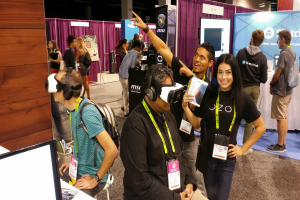07.13.18
By Lisa Major

Experiential and event marketing is a powerful tool for companies of all sizes. It allows brands to reach their target consumer on a personal level, fueling emotional connections that add value and build brand loyalty. However, it can be rather challenging to prove just how successful a campaign or event is. To understand, better yet, prove event ROI, marketers must determine the KPIs for the campaign, set goals, and have a plan in place to measure ROI. In this week’s Happy Hour, we take a look at the 4 event marketing metrics that matter the most. We have also included articles that focus on the key principles behind experiential marketing success, and event technology trends that improve the attendee experience.
“Knowing what to measure is critical, but the approach to measurement—the collection of data—is nearly as important. Effective performance measurement requires credible data.” ~Dax Collner
 As we pointed out in last week’s Happy Hour, event marketing campaigns are not easy to measure and KPIs must be determined early on. Marketers know and understand that event metrics matter, but what data should be measured, and which components should be tracked? The 4 event metrics outlined in this article are a great starting point and can help companies of any size understand what is working and what isn’t, helping to improve experiences and to build better events in the future.
As we pointed out in last week’s Happy Hour, event marketing campaigns are not easy to measure and KPIs must be determined early on. Marketers know and understand that event metrics matter, but what data should be measured, and which components should be tracked? The 4 event metrics outlined in this article are a great starting point and can help companies of any size understand what is working and what isn’t, helping to improve experiences and to build better events in the future.
“Whether you are marketing an event or you are a brand looking to sponsor an event, CX is integral to the overall marketing strategy.” ~Steve Olenski
Creating a seamless experience for event attendees is vital to an event’s success. Thanks to event technology like RFID wristbands, event marketers can create these seamless experiences by offering event goers an easy process that speeds up gate entry, gives attendees cashless payment options, and grants access to fan engagement elements and brand activations. By making the attendee experience as easy as possible, event marketers will develop a fan base that will keep them coming back year after year. And it’s not just event marketers that are reaping the benefits of this type of technology. It’s also improving brand partnerships which play a pivotal role in the overall customer experience.
“Every interaction is a touchpoint between your brand and the consumer, and the little touches are the things that delight.” ~Marc Woodland
As experiential marketing continues to grow, we are seeing more and more brands incorporating experiential activations into their overall marketing strategy. As brands take this leap, it’s important to point out that experiential marketing is not a one-size fits all approach. However, when you get down to the core principles, they are surprisingly consistent. Here we take a look at the backbone of experiential marketing and the 10 key principles behind successful campaigns.
“The more unexpected, unique, or ephemeral the experience, the more likely a customer will share it on social media. You can’t overestimate the motivational power of FOMO (fear of missing out).” ~Tommy Lee
For years restaurants have offered special events like trivia night, daily food and drink specials, and live music to draw in customers and keep them coming back. The restaurant industry is now seeing the value in not only offering these types of special events but adding an experiential twist to their marketing efforts. Restaurants are capitalizing on delivering unique and engaging brand experiences to customers and designing them to be completely shareable to extend their reach beyond the walls of the restaurant. From pop-up restaurants like Chick-fil-A’s rivalry restaurant to strategic partnerships, this article shares how restaurants can get creative with experiential marketing and tips on how to launch a campaign.
“Though mistakenly seen as a dying industry, trade shows are as popular as ever, and they have the potential to be even more valuable than their online marketing counterpart strategies — so long as you know what you’re doing.” ~Larry Alton
 Trade shows offer both B2B and B2C companies a great opportunity to network with potential customers and clients. The significance of face-to-face engagement at trade shows outweighs any other factor. When customers and clients can have a one-on-one interaction with a company, it resonates far more than any online interaction. And while trade shows are known for being the pioneer of live marketing (dating back to the 1800s), they continue to offer tremendous value for companies today. Here, Small Business Trends offers 7 tips to make your trade show a successful one.
Trade shows offer both B2B and B2C companies a great opportunity to network with potential customers and clients. The significance of face-to-face engagement at trade shows outweighs any other factor. When customers and clients can have a one-on-one interaction with a company, it resonates far more than any online interaction. And while trade shows are known for being the pioneer of live marketing (dating back to the 1800s), they continue to offer tremendous value for companies today. Here, Small Business Trends offers 7 tips to make your trade show a successful one.
From event technology trends to event marketing metrics, ATN’s Happy Hour brings you the latest and greatest in event marketing news. Subscribe to our blog and we will deliver the best content straight to your inbox once a month.
As one of the pioneer event staffing companies in the experiential and event marketing industry, marketing agencies and brands come to ATN Event Staffing time and time again to deliver top-tier staff for experiential marketing events, trade shows, pop-up events, and more.